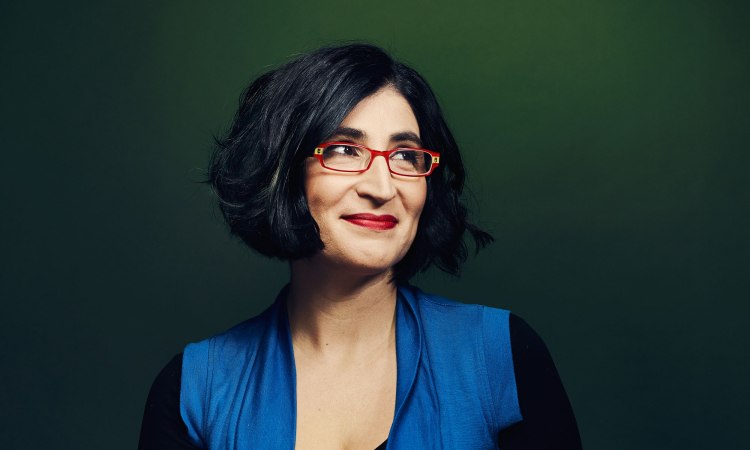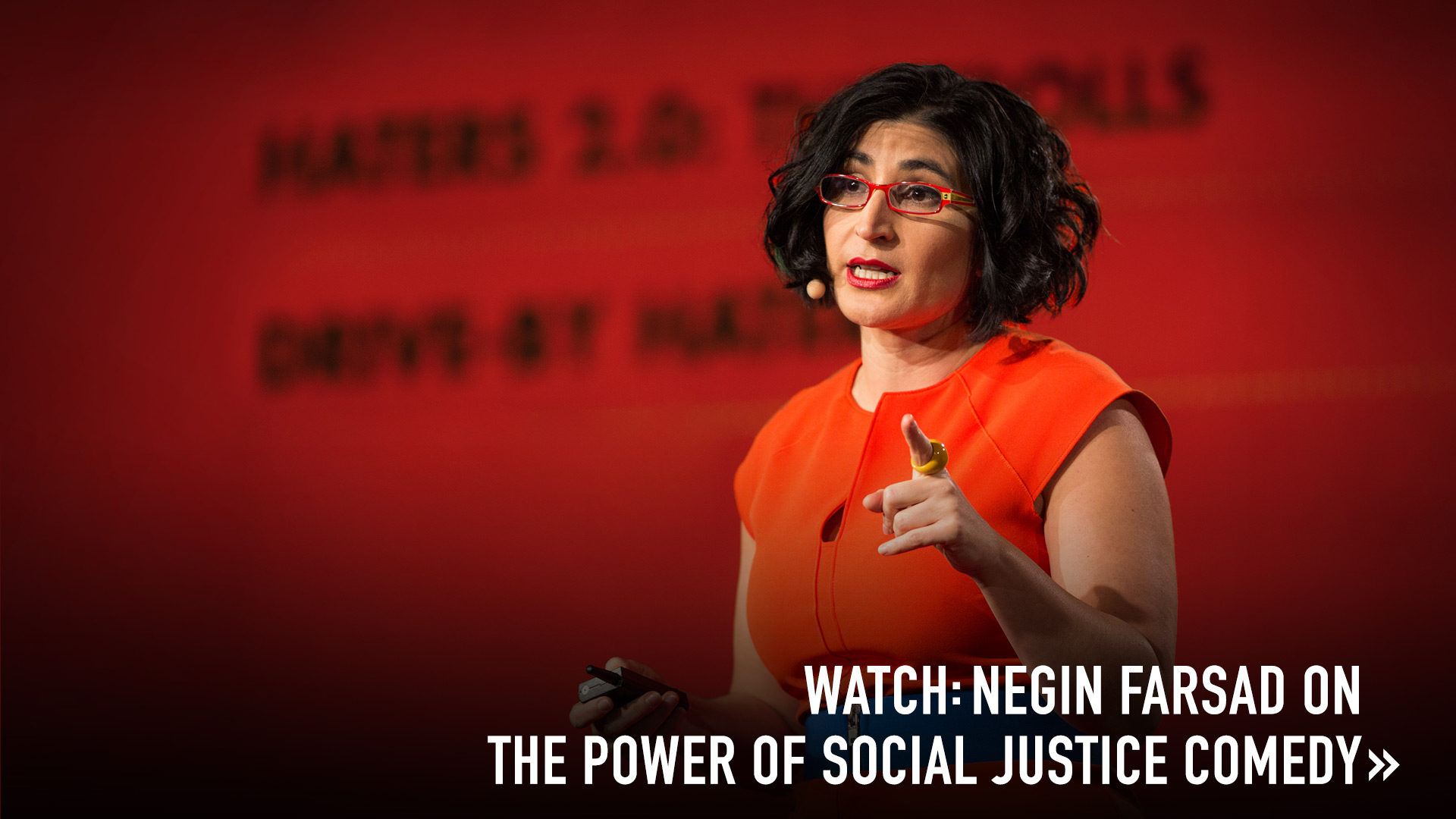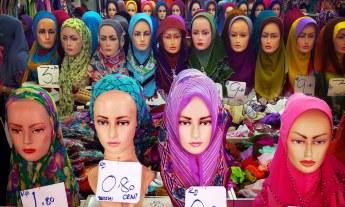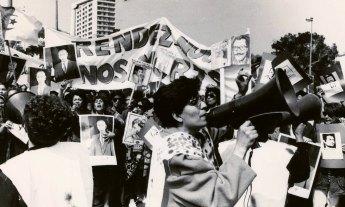
Iranian-American Muslim comedian Negin Farsad describes what happens when Islam meets Rumi meets apple pie.
Muslims don’t necessarily have the greatest icons here in the United States. The ones we do have are on the crap spectrum — that’s the end of the spectrum that’s loaded with bigotry, essentializing, infantilizing, theologocentrism and dog poop. Oh yes, I did just casually use the word theologocentrism like it was no big deal. Dropping ten-dollar words has the subtextual weight of saying, “I read a book once.”
Pretentious ten-dollarness aside, here’s the deal with theologocentrism: Scholars have had a tendency to explain all observable phenomena in a majority-Muslim country by saying, basically, “they’re like that because Islam.” In some major corners of academia, Islam is a catchall for anything a researcher doesn’t understand. Of course it’s not limited to academia. The world of infotainment has also grabbed hold of Islam to explain things they can’t fully comprehend, by which I mean everything. It’s easier to say, “Post-9/11 terrorism exists because Islam” than it is to say, “Post-9/11 terrorism exists because the western response to that act of terrorism has been addled by inconsistent policy processes that focused more on war than on nation-building, and those shortcomings have in turn created an environment in which anti-western sentiment might thrive.” See! That shit can’t fit on a poster, much less in Don Lemon’s mouth.
Because everything spins on Islam’s wheels, it’s easy to fall into the trap where we take the icons we’re given — like gun-toting terrorists or burka-clad ladies — and fight them on their own merits. We end up saying stuff like, “You can’t say that Muslims are terrorists because Islam is peaceful!” I’ve personally gone on rants trying to explain to people: “Hold up! Muslims exists on a spectrum; some are very conservative, and others are as secular as your best Christian friend who only goes to church once a year and/or never but still calls themselves Christian. What’s the diff, guys!?”
Islam is a hot-button word in the United States, but what if it doesn’t explain anything about us?
We twist ourselves into knots convincing people that Islam is peaceful and varied before we realize that, wait a second, you can be a Muslim while also recognizing that Islam doesn’t even explain half of your behaviors! Islam can be peaceful all it wants. It’s not the only relevant detail about a group of people. Islam is a hot-button word in the United States, but what if it doesn’t explain anything about us? What if it doesn’t explain terrorism at all?
It’s not for me to explain terrorism — there’s plenty of smart people to do that who are not comedians by trade. But I mention it because the need to shoehorn Islam as the major reason for everything in post-9/11 America defines so much of how we see mainstream American Muslims. We’ve created an arsenal of icons based on this shoehorning, and those icons do not represent me or fit my worldview.
Okay, so if you’re like me, you might think there must be cultural touchstones from the mother country to hold on to. Iranians certainly don’t define themselves as Islamic terrorists. But there again, for the hyphenated types — your Iranian-Americans, your Moroccan-Irish-Americans — the traditional icons from the mother country don’t always work either. For example, Iranians love poetry. That’s a nice stereotype and there’s truth to it because when in doubt, Iranians will bust out some totally insightful Rūmī poem in Farsi. Somehow reciting poetry settles questions, quiets arguments — it’s like eating mac ’n’ cheese, it makes Iranians feel all warm and mushy inside. But being a poetry nerd doesn’t really speak to me. I don’t know any of Rūmī’s poems. No offense — I’m sure he was a nice guy — but I’m American, so his oeuvre is alien to me. I’m more likely to recite Mos Def.
It’s like if you’re Russian-American, and maybe you don’t want wooden dolls inside of slightly bigger wooden dolls inside of slightly bigger wooden dolls. You take gin instead of vodka, you might prefer BLTs to borsht and you kinda don’t “get” Yakov Smirnoff. But at the same time you might not understand why Americans go Dutch on bills, why they’re so friendly to strangers, or why they take improv classes. Because you’re not fully American either, you’re this Third Thing, you’re a Russian-American and you have to forge this Third Thing identity in the United States. And it’s not easy.
Like the hypothetical Russian-American, I’m a Third Thing — Islam doesn’t explain me, Iranian poetry doesn’t explain me, and apple pie doesn’t explain me. And yet I understand all of those things. Being a Third Thing is a designation for people who straddle worlds, who may have a foot in every door yet their butt is hovering between door frames and they may even have more than two feet, and either way they’re definitely going to pull a groin muscle.
You also know you’re a Third Thing when you hang out with friends and you will totally dump on your own people but get very mad when anyone else tries to join in on the dumping.
How do you know you’re a Third Thing? For me, after the world got stuffed with Muslim iconography I didn’t recognize but was lumped into, that was when I knew. You know because you’ve been squeezed into a category that may technically be true but still doesn’t fit right. You squirm in it. It’s like having a rock in your shoe or wearing underwear that rides up your junk. Sure, they’re technically underpants, but they don’t fit right. Sure, I’m Muslim, but the way some people say it rides up my junk.
You also know you’re a Third Thing when you hang out with friends and you will totally dump on your own people but get very mad when anyone else tries to join in on the dumping. I can say all I want about Iran, but you!? You better be careful, because I’m not gonna let no one talk shit about Iran! But, you were just saying how — nuh-uh, zip it! You’re a Third Thing when you complain about the identity and you defend the identity in equal parts.
If you’re not a Third Thing, let me try to explain the feeling. Have you ever been at a summer camp that was overly athletic? (…she says, having been at a summer camp that was overly athletic.) You’re supposed to be excited, you’re supposed to have fun, your parents drop you off at this day camp every morning and you are filled with … dread. And then one day you find out that some of the kids are doing crafts off the field in a room, with window screens to keep out the bugs, and you ask if you can join them and be a part of that summer camp? There’s papier-mâché and paints and puppets, and it is heavenly. That’s when you know, you are the kind of person who likes “summer camp” writ large, but you’re not the type of person who likes the sports part. Some might call you a nerd. If sports and arts and summer camp were nations, immigration stories and ethnicities, you would be a Third Thing. Except that Third Things are kind of third-y all their lives, and summer camp is only six weeks long.
Even though my parents are full-on Iranians, I never learned the intricate customs—there’s a far-reaching set of rules and a whole language of etiquette. It’s so complicated! You could offer to buy someone a coffee and it could be interpreted as an insult depending on the other person’s relative age, income, citizenship status, gender, level of indigestion … I mean, it’s nuts. My parents gave me some basic Iranian rules but by no means all of them (plus I think they find it hilarious when they see me struggle). So, when I meet Iranians, I can speak to them in Farsi, and I can say nonformal American-style greetings, but I’m always inadvertently breaking rules that I didn’t even know existed!
I look like a cartoon character, with the voice of Butters from South Park. How could anyone attack me?
All of this happens because I’m that weird Third Thing and I’m trying to forge my own way, but it’s not easy. And when you’re a Third Thing, you’re addressing a heretofore nonexistent Third Thing Audience or Third Thing–Sympathizing Audience. You’re now the de facto voice of your people’s Third Thing subgroup, and the people in the First and Second Things aren’t necessarily going to like it.
I feel like I’ve been trying to build a Third Thing–Sympathizing Audience since I was a kid. In the professional world of comedy, trying to forge this Third Thing identity has been a task, lemme tell ya! I once made a film for which me and fellow comedian Dean Obeidallah rounded up a bunch of Muslim-American comedians — in a nonviolent way — and we toured the country. We went to places like Tennessee, Alabama, Mississippi, Georgia, Arizona, you know, places where they naturally love the Muzzies. We called the tour (and subsequent film) The Muslims Are Coming! which to some meant “preventative warning lecture on the coming Muslim apocalypse” and to others meant “live Muslim fetish adult pornography.” To most it meant “stand-up comedy show featuring Muslims.”
Now I’m not gonna lie: When we first set out to do these shows, there was a lot of concern. Friends in New York thought that people in the deep South were going to react badly. They thought that people would say mean things and maybe even … do something physically violent. I definitely was not as concerned about the violence because I thought, come on, I look like a cartoon character, with the voice of Butters from South Park. How could anyone attack me?
And yet, we did plenty to elicit public attention. We would set up an “Ask a Muslim” booth in the middle of a town center so people could ask us questions. We invited people to come “Bowl with a Muslim” — an event that taught us that Muslims bowl very badly. (This explains why Barack Obama bowls so badly.) We handed out flyers at farmers markets and gun shows and we were generally visible.
It was the visibility that had my friends and family concerned. Let’s be honest — the South gets a pretty bad rap. They thought those Southerners were gonna brutalize me. That they were gonna unfurl large-scale Confederate flags and protest my shows. That they were going to show up chewing tobacco and demanding the immediate deportation of all Muslim comedians.
Basically, the South has a PR problem not unlike that of Muslims. Because the Southerners I met (not to mention the large number of Mormons I met in Utah and Idaho) were far from that. They were open, welcoming. They had honest questions about us — questions like why don’t we denounce terrorism, or would Goldfish constitute halal food. I didn’t find them particularly racist, I didn’t think they were trying to run me out of town, and I generally had a great time. I did see too much gun appreciation in the South, but nobody’s perfect.
This is an edited excerpt from How to Make White People Laugh by comedian and TED Fellow Negin Farsad, published by Hachette Book Group.












